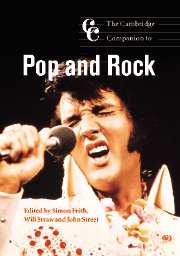11 - Rock, pop and politics
from Part III - Debates
Published online by Cambridge University Press: 28 September 2011
Summary
Some of the strongest claims for the political importance of popular music have been made by its greatest enemies. Its most radical effects have been identified by those who most despise the pleasures of rock and pop. From the earliest days of rock'n'roll, priests, parents and politicians have warned of the dangers inherent in the rhythms, the voices, the words and the images of the music. And each new wave in pop history has been greeted by the outcry of those who fear for its consequences. In the West, the political right has been terrified that it will undermine capitalism, family life and traditional values. Racists have seen it as a threat to ‘white purity’. Communists have seen it as subverting the socialist dream. These enemies have warned of its extraordinary power to influence the way people think and act. Their fears have not just prompted outbursts of indignation, but have actually resulted in policies and practices that directly affect the production and consumption of pop. Censorship has been a constant feature of the music's history. Under communism and capitalism, in the name of apartheid and Islam, pop music has been banned and musicians punished.
In 1995, Bob Dole led a campaign in the United States Senate against the conglomerate Time-Warner. He attacked the company for its promotion of rap artists like Snoop Doggy Dogg, who were signed to a Time- Warner subsidiary and who, said Dole, were promoting attitudes and behaviour that were an affront to the American people. Dole’s campaign succeeded, and Time-Warner severed its links with its subsidiary. At the same time in Britain, the government introduced the Criminal Justice Act which, among other things, outlawed particular forms of musical performance. A decade earlier, the Parents’Music Resource Centre, led by the so-called ‘Washington Wives’ (including Tipper Gore, wife of Al Gore), persuaded record companies to introduce a system of labelling to identify music that might cause offence.
- Type
- Chapter
- Information
- The Cambridge Companion to Pop and Rock , pp. 243 - 255Publisher: Cambridge University PressPrint publication year: 2001
- 19
- Cited by



